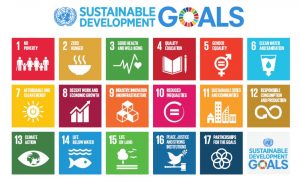If you are beginning to think about the strategic vision of BU2025 you will be aware that within it is embedded the topic of sustainability. The fusion vison is to find ways to enrich society and for all to have responsibility for our actions that will impact the local and global environment. It is expected that all curricula will have a focus of this somewhere within the programmes of learning for all students. https://newintranetsp.bournemouth.ac.uk/_layouts/15/WopiFrame.aspx?sourcedoc=/documentsrep/BU2025%20strategic%20plan%2019th%20June%202018.docx&action=default
For many the word ‘sustainability’ brings visions of the ‘green agenda’ and that it is all about the environment and question how the importance for this is relevant to their courses. However, the concept of Education for Sustainable development (ESD) is much wider than this. ESD can be defined as the:
Process of equipping students with the knowledge and understanding, skills and attributes needed to work and live in a way that safeguards environmental, social and economic wellbeing, both in the present and for future generations (HEA, 2014).
ESD brings in the philosophy of the Incheon Declaration (UNESCO 2015) with education principles recognising the value of humanity:
‘It is inspired by a humanistic vision of education and development based on human rights and dignity; social justice; inclusion; protection; cultural, linguistic and ethnic diversity; and shared responsibility and accountability…It is essential for peace, tolerance, human fulfilment and sustainable development.’
Such a philosophy requires a vision of value of the human condition, which includes wellbeing, promotion of dignity and respect, and recognition of individuality. Placing education, and the university as a whole, as an opportunity for the development of the student as a person with the potential to influence the world around them provides a different focus of sustainability. This requires a culture change.
The framework of the seventeen United nations Sustainable Development goals https://sustainabledevelopment.un.org/?menu=1300
(created following on from the Millennium Development goals) provides the grounding and resource for curriculum development. 
Over this year the CEL team have been involved in working with a number of initiatives across the university to raise the profile of the importance of sustainability as linked to the goals. These can be viewed on the CEL blog as well as links to information on the sustainability website. https://staffintranet.bournemouth.ac.uk/aboutbu/sustainability/
At our recent away day we discussed the potential of taking this agenda forward through the concept of a Community of Practice. We considered aspects such as how this maybe embedded within the culture of the organisation; bringing to the surface all the good practice across the university and joining up the work between staff and student bodies, and bringing in experts to advise.
We intend to be taking this forward and would encourage you to be part of this initiative when it develops. Please watch this blog for further news on the progress and that of other blogs linked to the SDG’s. If you would welcome discussion in your programmes around the concepts of education for sustainable development please make contact with the CEL team.
Jenny Hall, Neil Smith, Elouise Dickerson, Sara white, Carly Lamont, Simon Lincoln









Jenny,
Yesterday’s workshop which asked the attendees to consider two of the SDGs in terms of their teaching practice was a great way to encourage deeper consideration of how our units can impact on the goals.
Our subgroup looked at two of the goals; 4 (Quality Education) and 12 (Responsible consumption and production). We looked at these goals from the perspective of how CEL could support staff to embed them into their units and also how our own work could be modified to more closely align with the goals. For example, we considered the TEL Toolkit as an example of an open education resource that we know is accessed from around the world. Making all research freely available and also building a SDG layer onto LEAP were other ideas we had to support the Goals.